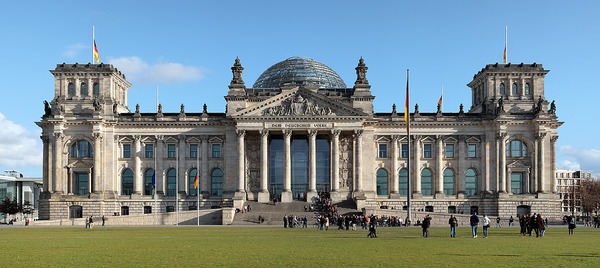The trial has begun following the alleged coup plot featuring a German aristocrat, a “massive arsenal” of weapons and the belief that Queen Elizabeth II’s death might have been a secret “signal” to act.
The trials of people allegedly connected to the so-called Reichsbürger movement are underway with those accused of being ringleaders set to appear before judges.
Plotters are said to have hatched a scheme to violently overthrow the German government.
Investigators claim that the conspiracy theorists believed the country was being run by a “deep state”.
The hearing in Frankfurt on Tuesday is the highest profile of three trials following nationwide raids in 2022.
The case is seen as highly significant because of both its size and the potential insights it could give into far-right networks.
The Reichsbürger, or citizens of the Reich, is a loose, disparate group that denies the legitimacy of the modern German state – even claiming it was installed by the victorious Allied powers after World War Two.
Domestic intelligence has estimated that around 23,000 people follow the movement which displays “antisemitic attitudes” and a “high affinity” for weapons.
It’s alleged that people connected to the Reichsbürger drew up plans for an armed group to enter the national parliament in Berlin and arrest MPs on what was called “Day X”.
According to the indictment, there were discussions about whether the death of the late Queen Elizabeth II was a “signal”.
Much of the attention in this trial will focus on Heinrich XIII Prince Reuss, a former real estate developer from Frankfurt who is descended from an aristocratic family, the House of Reuss.
It’s alleged the 72 year old held meetings of the group’s ‘central council’ at his home in east Germany and was earmarked as the ‘head of state’, had the coup succeeded.
According to the indictment, he’d have been responsible for negotiating a peace treaty with the Allies – and had appeared at the Russian consulate in Leipzig, as part of attempts to reach out to Moscow.
Also standing trial is former judge and MP for the far-right Alternative for Deutschland party, Birgit Malsack-Winkemann.
Prosecutors say she used her access rights to parliamentary properties to “smuggle” in co-conspirators to scout the area – and was responsible for the justice department on the group’s central council.
Their plans to re-organise Germany’s political structures would have involved a take-over of institutions at a state and local level. It is alleged that members were aware that this would “involve killing people”.
The ‘council’ was to act as the central body while a ‘military arm’ – consisting of 286 units – would have enforced the new order nationwide.
Prosecutors say the group had access to a “massive arsenal” of weapons including firearms, ammunition as well as night vision devices and handcuffs.
The association also had financial resources of around 500,000 euros, according to the indictment.
Over time, members are said to have become “increasingly isolated” from the outside world.
Jan Rathje, a senior researcher at the extremism monitoring agency CeMAS, says conspiratorial, sovereigntist movements can be dated back to a wish by some former Nazis to re-establish a National Socialist German Reich.
He says that the Reichsbürger movement, which has a violent, far-right tradition, has been dangerously underestimated.
Mr Rathje says that even though the alleged coup attempt would likely not have succeeded, people still could have been seriously hurt.
The trials – split into three because of the case’s size – are taking place in Stuttgart, Frankfurt and Munich.





